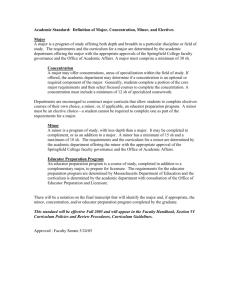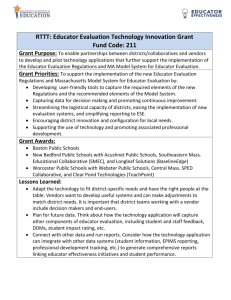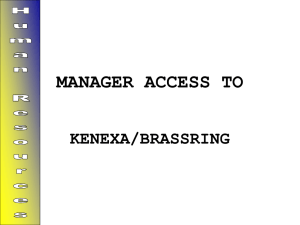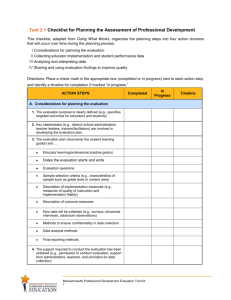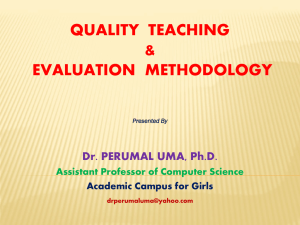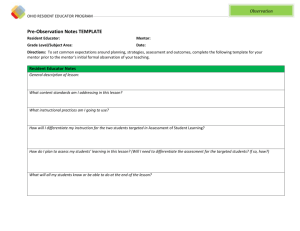EDUC_6914D_Syllabus
advertisement
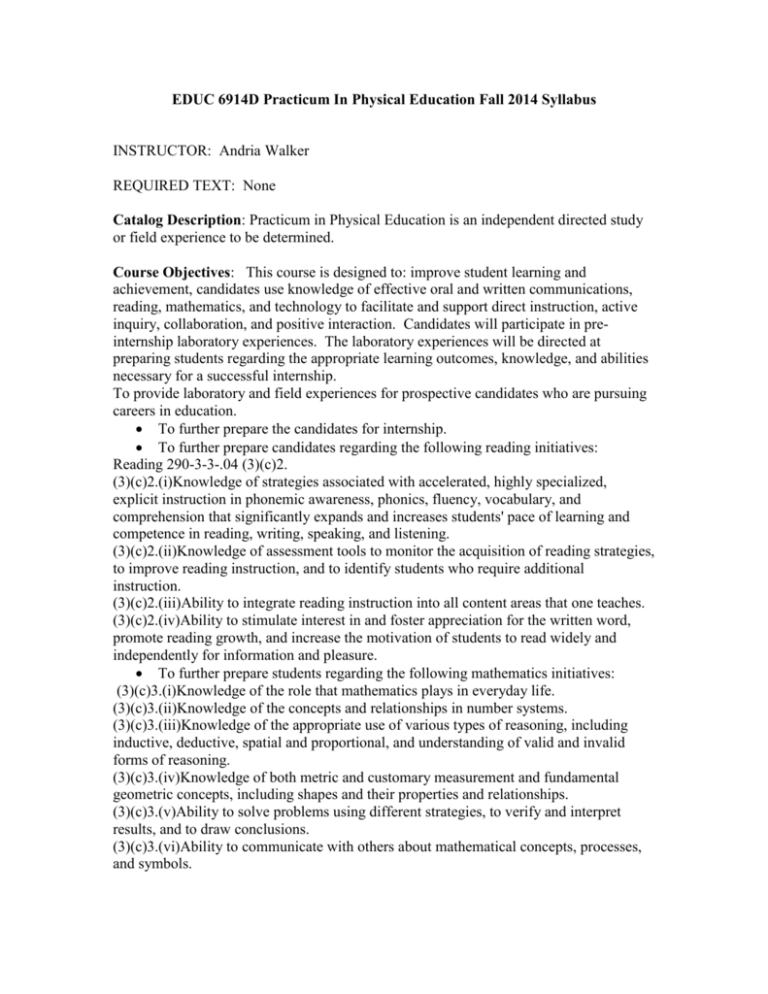
EDUC 6914D Practicum In Physical Education Fall 2014 Syllabus INSTRUCTOR: Andria Walker REQUIRED TEXT: None Catalog Description: Practicum in Physical Education is an independent directed study or field experience to be determined. Course Objectives: This course is designed to: improve student learning and achievement, candidates use knowledge of effective oral and written communications, reading, mathematics, and technology to facilitate and support direct instruction, active inquiry, collaboration, and positive interaction. Candidates will participate in preinternship laboratory experiences. The laboratory experiences will be directed at preparing students regarding the appropriate learning outcomes, knowledge, and abilities necessary for a successful internship. To provide laboratory and field experiences for prospective candidates who are pursuing careers in education. To further prepare the candidates for internship. To further prepare candidates regarding the following reading initiatives: Reading 290-3-3-.04 (3)(c)2. (3)(c)2.(i)Knowledge of strategies associated with accelerated, highly specialized, explicit instruction in phonemic awareness, phonics, fluency, vocabulary, and comprehension that significantly expands and increases students' pace of learning and competence in reading, writing, speaking, and listening. (3)(c)2.(ii)Knowledge of assessment tools to monitor the acquisition of reading strategies, to improve reading instruction, and to identify students who require additional instruction. (3)(c)2.(iii)Ability to integrate reading instruction into all content areas that one teaches. (3)(c)2.(iv)Ability to stimulate interest in and foster appreciation for the written word, promote reading growth, and increase the motivation of students to read widely and independently for information and pleasure. To further prepare students regarding the following mathematics initiatives: (3)(c)3.(i)Knowledge of the role that mathematics plays in everyday life. (3)(c)3.(ii)Knowledge of the concepts and relationships in number systems. (3)(c)3.(iii)Knowledge of the appropriate use of various types of reasoning, including inductive, deductive, spatial and proportional, and understanding of valid and invalid forms of reasoning. (3)(c)3.(iv)Knowledge of both metric and customary measurement and fundamental geometric concepts, including shapes and their properties and relationships. (3)(c)3.(v)Ability to solve problems using different strategies, to verify and interpret results, and to draw conclusions. (3)(c)3.(vi)Ability to communicate with others about mathematical concepts, processes, and symbols. To develop skills in self-evaluation of teaching effectiveness. To develop professionalism and appropriate behavior management strategies. To identify appropriate strategies for working with students and handling conflict and emergency situations. To become familiar with current local education policy To successfully complete the requirements of the 70-hour laboratory experience Course Requirements: Along with individual meetings with laboratory supervisors, students will receive an overview of student learning outcomes and achievement in a variety of areas. They will address laboratory and future internship requirements including record keeping, forms, performance outcomes, use of technology (including Live Text), and other internship requirements. Students will also complete two modules specifically developed to address the candidate’s needs regarding literacy including reading and math. The modules will address the State Department of Education professional standards regarding math and reading. The students will be required to successfully complete the modules prior to internship. The students will be required to successfully complete the 70 hours of laboratory experiences, in a minimum of 3 hour increments. 1. Modules: Each of the modules will require candidates to meet the following standards in reading and math. Both of these modules are located in the “content” section of Blackboard. They must be completed by October 3 at midnight and submitted via LiveText. 2. Field Experience A 70-hour field experience will be conducted at an elementary or secondary school. The candidate will be required to go to the school each day and observe the class they will be interning in and meet with the classroom teacher to collaborate in determining plans for the future internship. The candidate will assist the teacher during their observation. The candidate will be required to attend teachers meetings and other meetings that are required by school personnel. The candidate will discuss with their field experience coordinator how the field experiences relate to the development of a competent, reflective, and committed educator. The field experience and teaching assignment you will include the opportunity to observe and work with students with exceptionalities and from diverse ethnic, racial, gender, and socioeconomic groups. Candidates with document their observations in the above areas. The candidate will initiate and work on compiling the appropriate materials in their Live Text Portfolio The candidate MUST complete the Field and Lab Experiences Survey or they will receive a grade of F for the course. The survey can be found by clicking the following link or copying and pasting it in the browser: http://aum.co1.qualtrics.com/SE/?SID=SV_01BVcu2ORORQF3n Evaluation: Completion of Modules/Field Experience 100 points Total 100 points Accommodation of Special Needs Faculty in the School of Education make every effort to accommodate unique and special needs of students with respect to speech, hearing, vision, seating, or other possible disabling conditions. Please notify the instructor as soon as possible of requested accommodations or ways to help. Review of Dispositions and Outcomes 1. Subject Matter Knowledge (Disposition: Competent) The Professional Educator understands the central concepts tools of inquiry, and structures of the disciplines. 2. Human Development (Disposition: Reflective) The Professional Educator understands how people learn and develop. 3.Diversity (Disposition: Reflective) The Professional Educator understands how students differ in their approaches to learning and creates instructional opportunities that are adapted to diverse learners. 4. Planning (Disposition: Reflective) The Professional Educator develops plans based on knowledge of subject matter, students, community, and curriculum goals. 5. Learning Environment (Disposition: Competent) The Professional Educator uses an understanding of individual and group motivation plus is responsible for managing and monitoring student learning. 6. Instructional Strategies (Disposition: Competent) The Professional Educator understands and uses a variety of instructional strategies. 7. Communication (Disposition: Competent) The Professional Educator uses knowledge of effective verbal, nonverbal, and media communication technologies. 8. Assessment (Disposition: Competent) The Professional Educator uses formal and informal assessment strategies to evaluate. 9. Technology (Disposition: Reflective) The Professional Educator is proficient in the use of technology to enhance teaching and learning. 10. Professionalism (Disposition: Committed) The Professional Educator is a reflected practitioner who evaluates the effects of his/her choices and actions on others, and seeks to grow professionally. GOAL: Professional study in the School of Education is based on a model that recognizes and prepares teachers as Professional Educators. The school is committed to providing challenging opportunities for a diverse learning community in a nurturing environment. It is the vision of the School of Education to prepare competent, reflective, and committed professional educators. Competent is the ability to function at a high level of performance within the educational setting of expertise. Reflective is the ability to call upon the foundation of knowledge so as to make informed decisions within the educational setting. Committed is the ability to dedicate oneself to providing students with the most effective educational experiences possible and is demonstrated in ones professionalism and willingness to pursue life-long learning.

